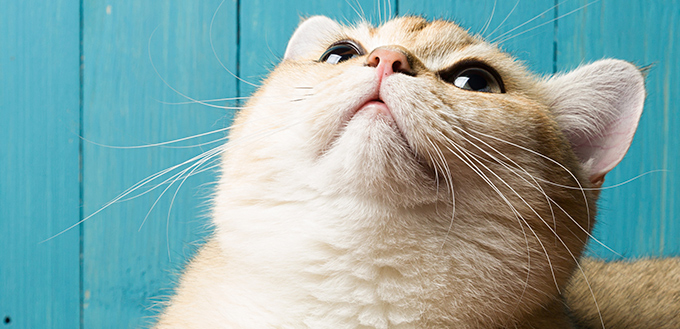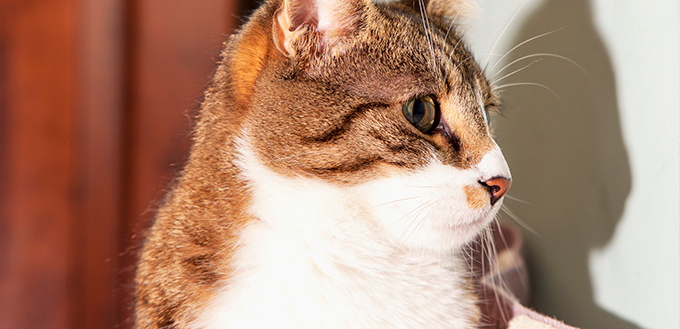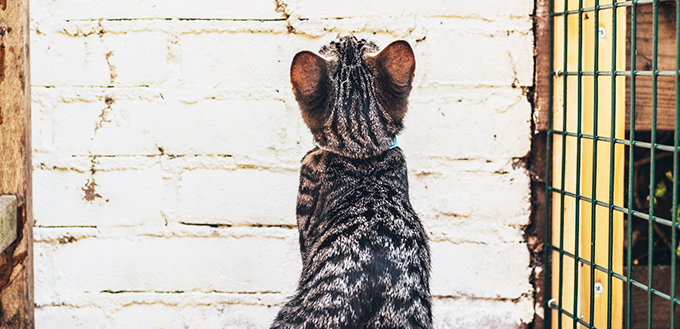Cats are mysterious and unpredictable creatures. If you have a pet cat at home, chances are you have already witnessed and been baffled by their unexplained and curious behavior from time to time.
One of the many things that cat owners often get spooked by is when they see their cats staring at an empty wall without moving an inch of their body for hours. For these spirited animals, this is an unnerving thing to do. Have you ever woken in the middle of the night and wondered, ‘Why is my cat staring at the wall at this hour?’ or ‘What is it that’s making them behave in this peculiar way?’ Well, let’s find out!

An Acute Vision
Compared to humans, cats have superior vision. While human eyes allow us a 180-degree view, felines eyes offer a 200-degree view. In addition, their peripheral vision also spans out far and wide to create that awesome cat stare.
Cats are also quick to respond to low lighting due to an increased number of rod cells which let them have a clearer sight at night. With the help of these special tissues that gather additional light, cats are much better at detecting movements, even in low lighting.
However, cats lose their edge when it comes to colored vision. Unlike humans, they cannot perceive a massive variety of colors due to the diminished number of cones in their retina, commonly known as photoreceptor cells. These receptors function best in bright light, which means cats do not see many colors during the day.
But since they have such a keen vision, cats can spot even the slightest movements in their surroundings. So, the next time you see your cat staring at an empty wall, it might be due to the presence of a tiny insect such as a bug or bee climbing up the wall. They can even see dust particles in the air during broad daylight and will stare at them for as long as possible, trying to detect any movement. While this may be negligible to the human eye, it is very much visible to our felines.
Audibility
As well as having acute eyesight, cats can detect high-pitched sounds that humans are unable to hear. While humans have an audible range of 20 Hz to 20 kHz, cats have a range of 55 Hz to 79 kHz. This is why, if there is a sudden noise in your house in the middle of the night, your cat is always the first one to wake up.
People who stay alone at home often sleep next to their cats since they can detect low-pitched sounds and instantly alert their humans by pawing or calling them out. Thanks to their powerful hearing ability, they can also chase rats inside the house even when they cannot see them.
So, do not get spooked out if you ever end up spotting your cat staring at the corner of a dark room or your kitten looking up when there is nothing there. They are probably listening to the slow music coming from your neighbor’s house. You never know!
You may also like our post on: Do Cats Like Music?
Curiosity
You are probably aware that cats can be curious and anxious pets with erratic personalities. One second, they are sitting next to you enjoying a television show, and the very next second, they run off to a different room only to stare at a wall for hours. It is this curiosity that gives them the patience to look at things for hours.
By paying attention to the slightest detail inside the room, cats are also often aware when something has been misplaced within seconds after entering the room. And they often stand outside the room staring at nothing, trying to figure out what has been moved or replaced in their absence.

Supernatural Beings
Even though it is the 21st Century, many people still believe in the presence of ghosts and other supernatural beings such as vampires and demons. Some people also think that cats can sense the presence of supernatural beings. In fact, that might be their only reason for staring at a single spot inside a dark or dimly lit room in your house.
However, you should know that there has been no proof that confirms the existence of supernatural beings living among us. So, there is nothing to be scared about if your pet suddenly demonstrates its ‘cat stare’.
A Medical Problem
If see your feline exhibiting strange behavior, including staring at the walls, and it also coincides with other symptoms including seizures, they could be suffering from a medical condition known as Feline Hyperesthesia Syndrome.
Though rare, Hyperesthesia in cats can cause them to suffer from anxiety and manifests in repetitive, obsessive, and self-destructive behavior. Their skin can also become sensitive to touch, and they end up licking and grooming themselves repeatedly.
Even after years of research, doctors still haven’t been able to identify the actual cause of Hyperesthesia in felines. Some believe it may be a repercussion of a traumatic event that took place in the past, causing the cat to act out, while others believe it is a neurological disorder. There is also a good chance that it might be due to a spinal injury, an abnormality of the nerves in the brain, or increased stress levels.
If you also see them itching their skin, you should ask your vet to examine them properly to check if they have been affected by flea allergy dermatitis (FAD). A flea allergy can cause their fur to fall off if scratched aggressively. This scratching and itching continuously will also aggravate their skin condition, and your cat can get paranoid. This can also lead to Feline Hyperesthesia Syndrome-related behavior such as anxiety and staring or meowing at a wall or nothing at all.
Having an unbalanced diet is thought to be another cause of hyperesthesia. Your veterinarian or animal nutritionist can prescribe a properly balanced diet for your cat to help with the condition.
Related Post: Best Cat Scratching Pads
Symptoms of Hyperesthesia
Himalayan, Siamese, and Burmese cats are more likely to suffer from hyperesthesia than other breeds. As well as seeming to ‘zone out’, the other signs and symptoms of Hyperesthesia in felines include:
- Biting
- Excessive scratching
- Constant jerking as they become sensitive to touch
- Showing self-destruction
- Self-grooming and licking
- Anxiety
- Pouncing on its tail
- Alarming vocalization
- Dilation of the pupils
- Acting out
- Seizure disorders
- A sudden increase in their activity
- Flea allergy dermatitis (FAD)

Treatment for Hyperesthesia
If your cat shows signs of any of the symptoms listed above, you should take them to a vet immediately. Anti-depressants such as SSRIs, sedatives, or anti-anxiety medicines are usually prescribed in such cases. With the help of an expert, you should also make a diet chart so that your cat can stay healthy and free from physiologic and metabolic stress.
To prevent future Hyperesthesia events, try to spend more time with your cat, as you may not always know when your cat is stressed out or facing anxiety issues.
Take a look at our guides on Anti-Anxiety for Cats and Calming Collar for Cats.
Cats Staring At Nothing
Understandably, most cat owners can be unnerved to find their cats staring at walls and other specific objects. But what are you to make of their behavior if they stare at nothing for a significant period? The superstitious may even suggest that these feline creatures, attuned to the supernatural, are observing something ‘otherworldly’.
However, having established that cats are well-accustomed to their surroundings with their superior eyesight and hearing, there is no doubt that this matter is nothing out of the ordinary. However, while we may find ourselves staring at space for hours, lost in our thoughts, it is different from cats. If your pet is showing such errant behavior, then it does have an explanation.
As mentioned previously, cats have eyesight that surpasses those of humans in many ways. So, if you feel that they are staring at ‘nothing’ for hours, it probably means that your pet is seeing or observing movements or minuscule things that go undetected by the human eye.
Another thing to consider is that cats have excellent auditory organs that allow them to perceive sounds beyond our capabilities. So, the matter may be as simple as them focusing on slightly muffled sounds or out of their hearing range while staring at nothing much like human beings often do. If not, they may be trying to decipher a new sound alien to them but also inaudible to us. Or they are probably fascinated by those dancing particles visible in broad daylight!
As well as superior hearing and eyesight, cats also have a sense of smell that is fourteen times stronger than human beings. This is due to the double quantity of receptors in the olfactory epithelium, which is basically the cells responsive to smell.
Just like focusing on sounds, your feline companion may have noticed a smell that they particularly like or find intriguing and is spending an awful lot of time trying to discern its origin or simply enjoying the odor while gazing at ‘nothing’. Even if you cannot smell it yourself, air fresheners or other products may help drive the former odor away.
The Bottom Line
So, ‘why does my cat meow at the wall as if there is something there?’ and ‘why does my cat stare at nothing at all?’
In many cases, there is a perfectly harmless explanation as to why cats stare, and it is most likely related to something that they can see, hear, or smell that you are unable to detect.
This behavior can also be linked to a medical condition triggered by stress or obsessive behavior.
It is essential to always make your feline friends feel safe at home as this can minimize and even prevent such out-of-the-ordinary occurrences. Like any other pet, cats also crave attention and love. But leaving cats alone for hours can make them feel lonely, and the feeling of loneliness is likely to stress them and cause them to ‘act out’.
Related Post: Best Cat Toys
So, even after a busy day at work, try to make up for the day when you get home by playing or cuddling with them. A little bit of love goes a long way for these adorable yet unpredictable creatures and spending time with them every day can help make sure your cat is healthy and happy.
But in all honesty, you won’t ever really get a proper explanation for why they may stare at the wall for hours. However, if you suspect a medical reason or are ever concerned, please visit the vet’s clinic with your fur baby and get an expert opinion.
Source:
- Behavior problems in cats MSD Vet Manual





